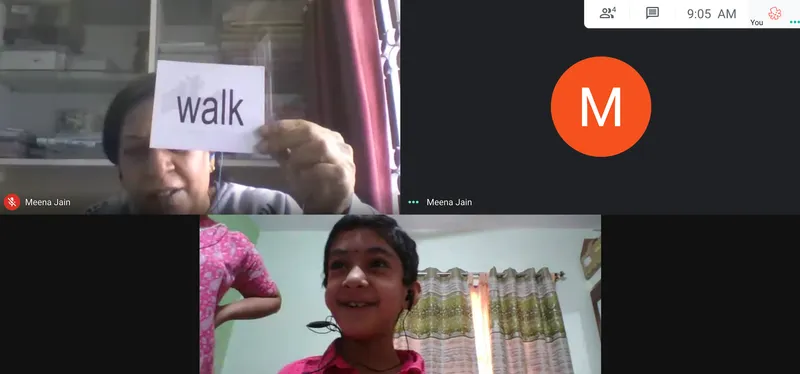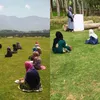Special education in India finds opportunity in adversity
The Covid-induced lockdown has affected children with special needs in a profound way. However, adversity has brought to the fore several organisations who are doing commendable work by bringing remote learning and home-schooling to children, especially those from less privileged background.
Kuhu, a 14-year-old child with special needs, has been home for months, locked indoors and rarely ventures out.
Since the lockdown in the second week of March, the Bubbles Centre for Autism, which she used to regularly attend in Bengaluru, has been closed due to the COVID-19 outbreak.
Kuhu’s mother, Renu Singh, says, “Though Kuhu is fortunate to receive online classes, the hours of intervention and social interaction are limited. This was a major advantage of attending the Bubbles regular school programme. The pandemic has limited her interactions and learning through peers, teachers and other support staff and impacted her physical fitness. Kuhu has become more withdrawn and lonely. Skill-building has also taken a back seat and is completely dependent on us parents taking time out to actively work with her. In case we are busy elsewhere, sick, tired or caught up in other pressing issues, Kuhu is left on her own, not doing anything meaningful. I have had to quit my job to be able to attend to Kuhu during her classes. This has impacted us financially as well”.
Renu is a recipient of the IDFC FIRST Bank supported Kamyaab Scholarship program at Biswa Gauri Charitable Trust.
Kuhu is not alone in this. Her story is one that resonates with many children like her who need special care and attention.
Kuhu used to have happy and fruitful hours with her peers, teachers and therapists. But when the pandemic set in, it brought with it a new normal. Lockdowns, quarantines and social distancing became a norm. The change was too fast. And too sudden for children like Kuhu, who need time and care to adjust to changes. It hasn’t been easy.
Her mother, Renu, and many parents of children with varying degrees of special needs have had to step up and become co-therapists since all intervention has gone virtual.
Most organisations and educators are still struggling to adapt to the e-teaching technique, which have caught them completely off-guard.
Sarbani Mallick, Founder at Biswa Gauri Charitable Trust, an institution working to empower young adults with autism and intellectual challenges, “As a leader, the personal touch with my team of educators is missing and it becomes difficult to coordinate and keep up the morale of the team. The charm of the workplace and the vibrancy is missed virtually. One-to-one interactions are being conducted virtually and we engage in strong capacity building of the team to adapt to the 'new normal', but the effective implementation is dependent on parents completely unlike the physical setting.”
Fostering social communication and interaction for children with developmental disabilities is key and the virtual space has taken away the power of one-to-one engagement.
Organisations across India are testing new avenues to solve for this and have begun curating virtual events to get children to mingle and showcase their skills.
But alienation persists.
Parents are now exploring various options of schooling, including in-person, remote learning, home-schooling and other hybrid technology-enabled options.
While the schools that serve the affluent have made a quicker transition to virtual learning, there is a huge section of the populace that has been isolated in the recent wave of edtech solutions as a response to social distancing.
Students in government schools, in primary schools in smaller towns and villages and those seeking niche and personalised teaching, especially those with disabilities, are struggling the most.
Livelihoods of families who belong to the ultra-poor or the bottom of the pyramid segments have also impacted their ability to access disability services, which they were already struggling to sustain in the pre-COVID era.
Challenges in the ecosystem
Children who need special education are not a homogenous group. They include students with a wide variety of mild to severe cognitive, physical, social, emotional, and behavioural disabilities.
The stigma, lack of social acceptance and misconceptions around disabilities, especially intellectual disabilities have a bearing on how inclusive homes, communities, schools and other spaces are in the ecosystem. This tends to have a domino-effect as they not only add undue pressure on parents emotionally but also lead to lack of open discussions, reduced opportunities for peer-learning.
But above all, it becomes a barrier for the child to receive holistic support – which is very important in early years.
Unlike mainstream schooling which is accessible and has standardised curriculum, access to special education services is also a challenge.
Making the right decision for the child is an energy-intensive exercise. It means having the right information on choices available, being able to find specialists, the right mix of therapeutic interventions, assistive devices and a school/space that will offer all of this at an affordable rate to the family.
The pandemic induced lockdown and social distancing has further amplified challenges parents and children were already facing.
Opportunities arise out of adversity
But all is not bleak.
COVID-19 has also paved the way for discovering opportunities in adversity. Along with Tactopus Learning Solutions, a social enterprise that makes interactive, audio tactile, early learning material for the visually impaired, we have had some insightful focussed group discussions with parents, special educators and development specialists. This has paved the way for the creation of Tactopus Connect.
Tactopus Connect is a unified platform offering personalised intervention services for young children with developmental delays or disabilities. It ‘connects’ their parents to the right resources, both specialists and learning materials, enabling them to track progress along with their individualised growth plans – all virtually. Parents are no longer bound by geographical barriers like they used to be and their canvas of choice has become larger.

Saloni Mehta, Co-Founder at Tactopus Learning Solutions, says, “With technology paving the way, I foresee special education in the future shifting towards a more holistic approach, ridding itself of the negative baggage and integrating education for every child, focusing on their strengths more and deficits less. We hope that the digital divide will continue to reduce especially in a country like India, where we cater to a multitude of inequalities caused by income, geography, and disability. The solutions, therefore, need to be multifaceted as well.”
To bridge the digital divide that acts as a barrier, IDFC FIRST Bank is providing laptops, mobile devices, internet packages to families who are under-resourced, to ensure their children are receiving disability services despite being confined to their homes.
As a corporate social responsibility practitioner, I firmly believe that this is the time to adopt an ecosystem approach and work not only with non-profits but also tech innovators who can create solutions ground-up with special educators and parents who truly understand the needs of children with special needs.
Corporates can also provide strategic guidance on digital learning tools, creating standardised curriculum, providing virtual livelihood opportunities for children with special needs.
(Disclaimer: The views and opinions expressed in this article are those of the author and do not necessarily reflect the views of YourStory.)








